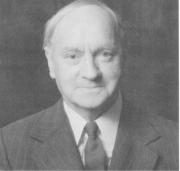|
|
||||||||||||||||||||||||
 |
Featured person
Recently added |
Rev Ernest Davey (1890 - 1960): |
||||||||||||||||||||||
James Ernest Davey was described by a later Moderator of the Presbyterian General Assembly as “probably the most brilliant scholar ever to hold a chair in an Irish Presbyterian theological college”. He was also put on trial by that church for heresy, in a case which drew much interest throughout Ulster and beyond.
He was a son of the manse of First Presbyterian Church, Ballymena. He had an impressive school career at Methodist College and Campbell, Belfast, and though winning a scholarship to Queen’s College, Belfast, he went instead to King’s College, Cambridge, where he obtained first class honours in classics and theology, graduating BA in 1912. He obtained a Bachelor of Divinity degree from Edinburgh University, studied also at Heidelberg and held a fellowship at King’s College for six years. He returned to Belfast where he was licensed as a minister in his father’s church, and in June 1917 became the youngest person ever appointed to a chair at the Presbyterian College in Belfast; in this case, of Church History. He would subsequently hold chairs of Biblical Literature, Hebrew and Old Testament, and New Testament Language, Literature and Theology. He had already, in 1923, published, besides a memoir of his father (who had died in 1919), a book, “The changing vesture of the faith: studies in the origins and development of Christian forms of belief, institution and observance”. This helped bring him, a “modernist” in the Church, to the attention of the “conservatives”, especially Rev James Hunter, a member of the committee of management of the College. He and others resorted to dirty tactics, as they might be called, such as bitter personal attacks, and leafleting against and heckling him at public and church meetings.
Hunter objected to Davey’s liberal/progressive interpretations of the Bible, and formally had him charged with heresy. There were five counts, of rather technical theological points, such as the doctrine of forgiveness, the character of Christ, the nature of scripture, sin, and the doctrine of the Holy Trinity. It was especially his views on scripture interpretation which annoyed the conservative, Davey maintaining that interpretation of scripture as a living set of texts which was open to hermeneutic interpretation, including modern scholarship in areas such as language and history, as opposed to Hunter and his colleagues who took a much more fundamentalist line of divine inspiration of the Bible which had been presented to mankind as it stood, and was not to be “interpreted”. The trial took place in early 1927. Davey either denied the charges or justified his position rationally. Indeed, the College was slated by the conservatives as a “seed-bed of rationalism”. Davey was exonerated, also on appeal in June, by 707 votes to 82. The frustrated conservatives left the Church and formed another one which still functions today, though rather a minority within Presbyterianism. (Though they would maintain that they were themselves the true Presbyterians and they had left an apostate church).
Davey then resumed his duties at the College, teaching, serving on various committees, and writing, including a history of the church “The story of a Hundred Years” (the years in question were 1840-1940) and some theology works such “The Jesus of St John”. He served as moderator of the general Assembly in 1954; his election was greeted by some conservatives by an attempt to organise a book-burning. He was awarded honorary doctorates by Edinburgh University, Queen’s University, Belfast, St Andrew’s and Dublin Universities.
He died only a few months before his planned retirement. Another later Moderator wrote of him that he “was one of the best scholars the Presbyterian Church has produced. He was also one of the gentlest of men.” And his close friend from another faith, Rabbi Jacob Schachter, Head of the Jewish Community in Ulster, dedicated a selection of ihis papers and talks to Davey, writing in the Forward that He was "an illustrious scholar and great humanist and mourned by all who knew him". Ernest Davey was related to another Presbyterian minister, Rev RR (Ray) Davey, who was a prisoner of war (he witnessed the notorious detruction of Dresden in February 1945) a chaplain at Queen's University, and best known as the founderr of the internationally-acclaimed Corrymeela Community, dedicated to tackling the religious divisions, misunderstandings and sheer animosities predominant in Ulster society.
| Born: | 24 June 1890 |
| Died: | 17 December 1960 |
| Richard Froggatt |
| Bibliography: Dictionary of Irish Biography; John Dunlop: “A Precarious Belonging” (Belfast 1995); Finlay Holmes: “Our Irish Presbyterian Heritage” (Belfast 1985); Ray Davey, Take Away This Hate (Belfast 1983) |


Home | Our Policies | Plaques | Browse | Search | Sponsors | Links | Help | Contact
Privacy & Disclaimer | Cookie Policy | Site Map | Website Design By K-Point
© 2024 Ulster History Circle









